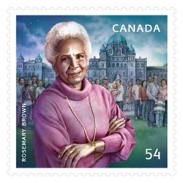Every October since 1992, Canada celebrates Women’s History Month, with the highlight being Person’s Day on October 18. October has been selected because of the historical significance of the “Persons Case” decision of 1929, a landmark victory in the struggle of Canadian women for equality.
Canada was governed by the British North America Act. It specified that only “qualified persons” were eligible to be appointed to the Canadian Senate, a provision that had historically been interpreted to mean men only. Declaring that women were not “qualified persons”, and women were therefore ineligible for the Senate.
Emily Murphy was a Canadian women’s rights activist, jurist and author. In 1916, she became the first female magistrate in Canada, and in the British Empire. Murphy used a provision in the Supreme Court of Canada Act that allowed any five persons acting as a unit to petition the Supreme Court for an interpretation of any part of the constitution to fight this institutional sexism.
On August 27, 1927 Murphy and four other women; Nellie McClung, Henrietta Muir Edwards, Louise McKinney and Irene Parlby petitioned the Supreme Court to review the government’s decision that denied women from becoming senators.
The “Persons Case”
In 1928, the Supreme Court of Canada ruled that women were not considered “persons” under the law. The five women known as ‘’The Famous Five’’ appealed the court’s judgment to the only higher legal authority that existed at the time. As a result, on October 18, 1929 the Privy Council in Great Britain ruled that women could become Senators because they are in fact persons.
With women now eligible to sit in the Senate, the country’s highest male-dominated institution, they could no longer be denied access to other institutions and establishments reserved just for men. In the larger scale this ruling opened doors for women to access sectors previously reserved only for men.
Women’s History Month represents an opportunity to highlight the important contributions of women to Canadian society and how we all benefit today from the achievements of the original Famous Five and other women activists in the quest for women’s equality.
In Solidarity,
Human Rights Committee
‘‘We must open the doors and we must see to it they remain open, so that others can pass through.’’
‘’sisterhood is powerful’’
Rosemary Brown, politician, activist

